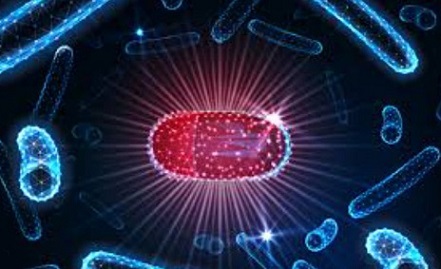Rhodamine 19 Alkyl Esters - Mitochondria-Targeted Antioxidants That Fight Against Bacterial Infections
Nikhil Prasad Fact checked by:Thailand Medical News Team Jun 03, 2024 1 year, 8 months, 2 weeks, 4 days, 2 hours, 57 minutes ago
Medical News: In recent years, the scientific community has been abuzz with research on mitochondria-targeted antioxidants (MTAs) for their potential therapeutic benefits. Among the most notable are MitoQ and SkQ1, both known for their powerful antioxidant properties. Interestingly, their fluorescent rhodamine analog, SkQR1, a decyl ester of rhodamine 19 with plastoquinone, has shown a significant antibacterial effect against Gram-positive bacteria, while exhibiting almost no impact on Gram-negative bacteria.
 Rhodamine 19 Alkyl Esters - Mitochondria-Targeted Antioxidants
Rhodamine 19 Alkyl Esters - Mitochondria-Targeted Antioxidants
That Fight Against Bacterial Infections
Discovery and Mechanism of Action
The Lomonosov Moscow State University and Mitotech LLC team discovered that the multidrug-resistant (MDR) pump AcrAB-TolC, known for expelling SkQ1, did not recognize or pump out SkQR1 and dodecyl ester of rhodamine 19 (C12R1). Rhodamine 19 butyl (C4R1) and ethyl (C2R1) esters were effective in inhibiting the growth of ΔtolC Escherichia coli but lost their potency with wild-type E. coli, which pumped them out. This suggests that SkQR1’s antibacterial action might differ from that of SkQ1, indicating a unique mechanism.
The Quest for Effective Antibacterial Agents
The search for effective antibacterial agents has never been more urgent, given the rise of multidrug resistance. The team investigated various rhodamine 19 derivatives for their antibacterial properties. These derivatives, known to accumulate in mitochondria due to their lipophilic cationic nature, can disrupt membrane potential and inhibit ATP synthesis, similar to their effects in bacteria.
Comparing Rhodamine and Triphenylphosphonium Derivatives
Triphenylphosphonium derivatives have been proposed as mitochondria-targeted substances by many past studies that were covered by Thailand
Medical News in the past. However, unlike these phosphonium derivatives, the activity of rhodamine 19 alkyl esters increased with the shortening of the alkyl chain, contrary to initial expectations.
Antibacterial Activity of Rhodamine Derivatives
Rhodamine derivatives displayed strong antibacterial activity against Gram-positive bacteria like Staphylococcus aureus and Mycobacterium smegmatis. The Minimum Inhibitory Concentrations (MICs) indicated that SkQR1 was comparable to SkQ1 in effectiveness. However, for Gram-negative bacteria like E. coli, SkQR1 was less effective, and its efficacy did not improve even in the ΔtolC mutant strain, suggesting that other factors or pumps might be at play.
Localization and Accumulation in Bacterial Cells
Using fluorescence correlation spectroscopy (FCS) and fluorescence microscopy, the researchers observed that SkQR1 accumulated in bacterial membranes, indicating a voltage-dependent uptake. The more hydrophobic SkQR1 accumulated more effectively in cells compared to C4R1, although this did not always correlate with antibacterial efficacy.<
br />
The Role of MDR Pumps
The study highlighted the role of MDR pumps, particularly AcrAB-TolC in E. coli, in expelling rhodamine derivatives. Interestingly, C4R1 was expelled by these pumps, whereas SkQR1 was not, suggesting that the length and structure of the alkyl chain significantly influence pump recognition and expulsion.
Potential and Future Directions
The findings underscore the potential of rhodamine 19 alkyl esters as antibacterial agents, particularly against Gram-positive bacteria. The differential accumulation and expulsion mechanisms offer insights into designing more effective antibacterial compounds. However, the apparent toxicity of these compounds and their impact on cell membranes need careful consideration.
Conclusion
Rhodamine 19 alkyl esters, especially SkQR1, present a promising avenue in the fight against bacterial infections, particularly with their unique mechanisms differing from traditional antibiotics. This research paves the way for developing new antibacterial agents that can overcome multidrug resistance and provide effective treatment options for bacterial infections.
Implications for Modern Pharmacology
The ability to alter the recognition of substances by MDR pumps by varying the linker length has significant implications for pharmacology. This could lead to the creation of new antibacterial substances that can effectively combat resistant pathogens, highlighting the importance of continued research in this area.
In summary, while much remains to be understood about the precise mechanisms and potential applications of rhodamine 19 alkyl esters, their role as effective antibacterial agents offers a new hope in the ongoing battle against infectious diseases.
The study findings were published in the peer reviewed journal: International Journal of Molecular Sciences
https://www.mdpi.com/1422-0067/25/11/6137
For the latest on new antibacterial agents, keep on logging to Thailand
Medical News.
Read Also:
https://www.thailandmedical.news/news/study-finds-that-doctors-are-actually-killing-sepsis-patients-by-using-the-antibiotics-piperacillin-and-tazobactam
https://www.thailandmedical.news/news/breaking-hiv-news-antibiotics-called-pleicomacrolides-allows-immune-system-to-kill-hiv-infected-cells-according-to-university-of-michigan-study
https://www.thailandmedical.news/news/combining-antibiotics-changes-their-effectiveness
https://www.thailandmedical.news/news/these-antibiotics-may-endanger-vascular-health
